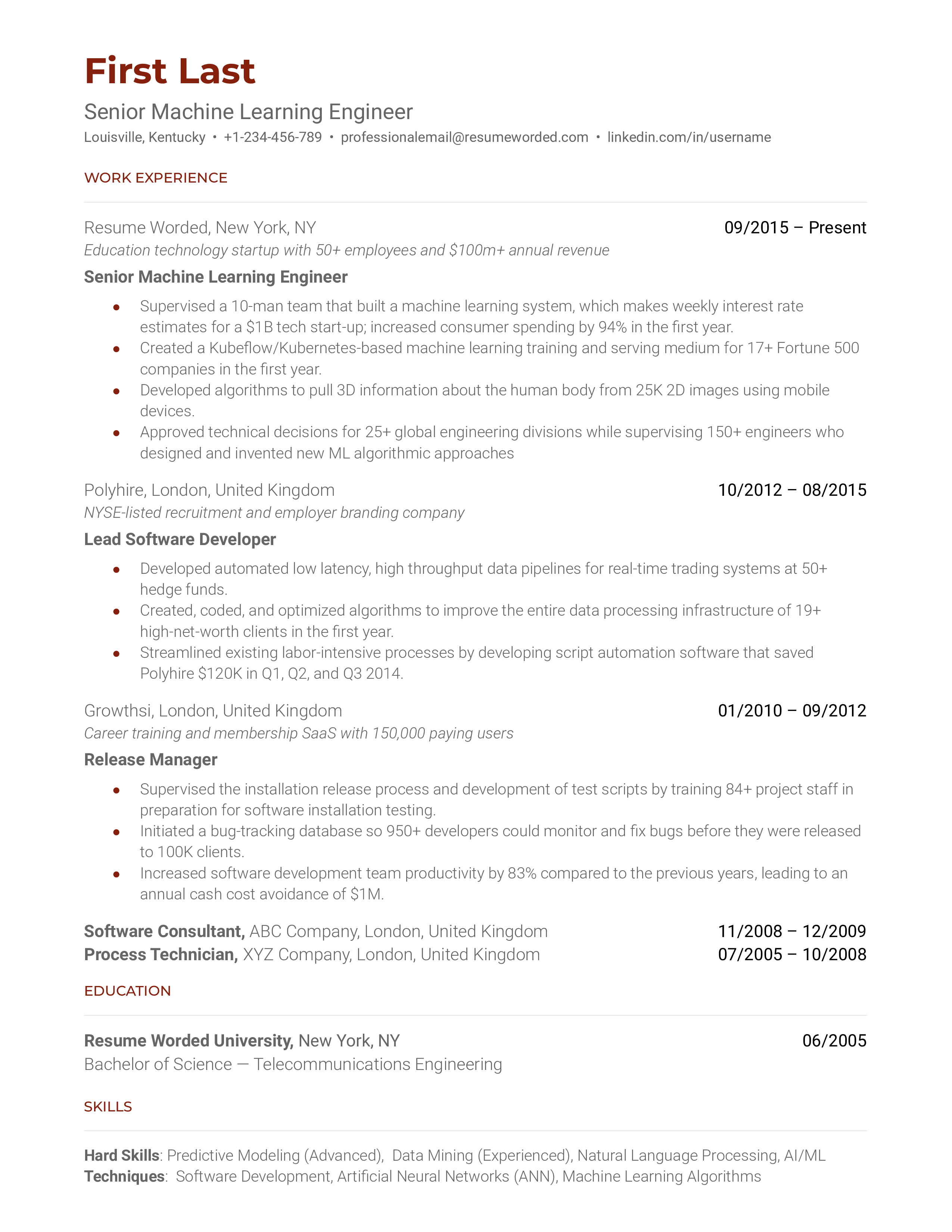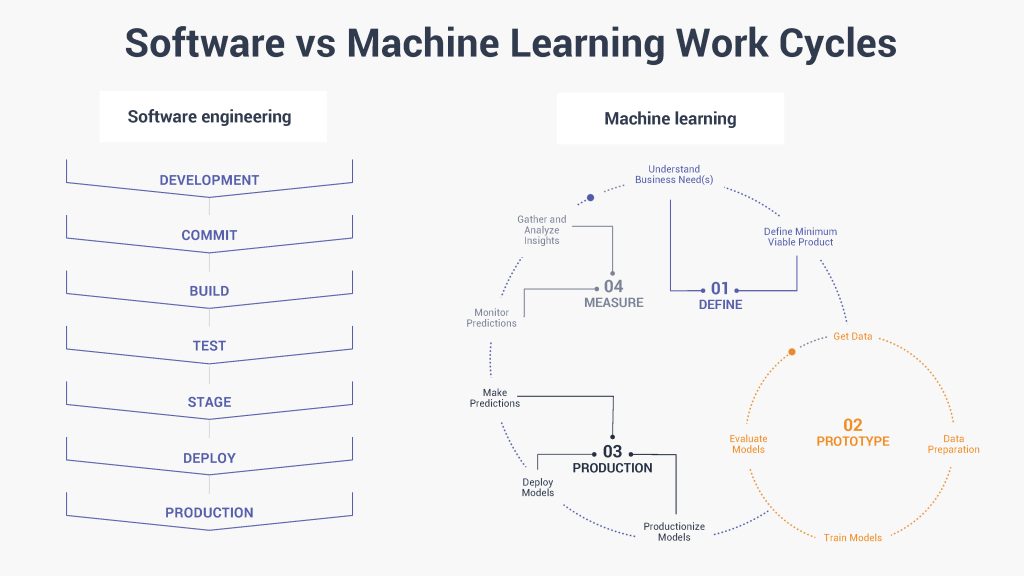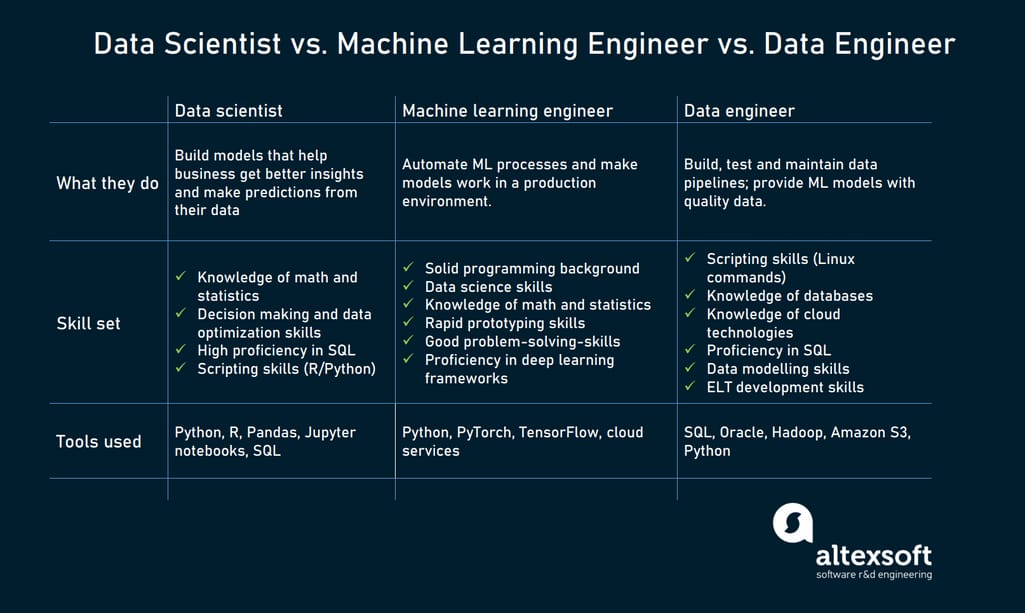All Categories
Featured
Table of Contents
- – The Best Strategy To Use For Machine Learning ...
- – Zuzoovn/machine-learning-for-software-engineer...
- – All about Aws Machine Learning Engineer Nanod...
- – The Facts About How To Become A Machine Learn...
- – The Buzz on Generative Ai Training
- – Getting The Ai Engineer Vs. Software Enginee...
- – Getting The Machine Learning Is Still Too Ha...
Some people believe that that's unfaithful. If someone else did it, I'm going to use what that individual did. I'm compeling myself to assume with the feasible solutions.
Dig a little bit deeper in the mathematics at the start, just so I can construct that structure. Santiago: Finally, lesson number seven. I do not believe that you have to understand the nuts and screws of every formula before you utilize it.
I've been utilizing semantic networks for the longest time. I do have a sense of just how the gradient descent works. I can not clarify it to you today. I would certainly need to go and inspect back to really obtain a better intuition. That does not imply that I can not address things making use of semantic networks, right? (29:05) Santiago: Trying to require people to assume "Well, you're not mosting likely to succeed unless you can clarify each and every single detail of just how this functions." It goes back to our sorting instance I think that's simply bullshit suggestions.
As an engineer, I've dealt with numerous, many systems and I've utilized numerous, several points that I do not understand the nuts and bolts of how it functions, despite the fact that I comprehend the effect that they have. That's the final lesson on that string. Alexey: The funny thing is when I think of all these libraries like Scikit-Learn the algorithms they use inside to implement, for instance, logistic regression or another thing, are not the exact same as the formulas we study in artificial intelligence classes.
The Best Strategy To Use For Machine Learning In Production
Even if we attempted to find out to get all these essentials of maker understanding, at the end, the formulas that these collections utilize are different. Santiago: Yeah, absolutely. I think we require a lot more materialism in the sector.

By the method, there are 2 different courses. I typically talk with those that want to operate in the market that intend to have their effect there. There is a course for researchers and that is completely different. I do not dare to mention that because I don't recognize.
However right there outside, in the sector, pragmatism goes a long means for sure. (32:13) Alexey: We had a comment that stated "Feels more like motivational speech than speaking about transitioning." So perhaps we should change. (32:40) Santiago: There you go, yeah. (32:48) Alexey: It is an excellent inspirational speech.
Zuzoovn/machine-learning-for-software-engineers Can Be Fun For Everyone
One of the points I wanted to ask you. Initially, allow's cover a pair of points. Alexey: Allow's start with core tools and structures that you require to find out to really shift.
I understand Java. I know SQL. I know how to make use of Git. I know Celebration. Perhaps I understand Docker. All these things. And I find out about machine understanding, it feels like a trendy thing. What are the core tools and frameworks? Yes, I enjoyed this video clip and I obtain convinced that I do not need to get deep right into math.
Santiago: Yeah, definitely. I assume, number one, you should start finding out a little bit of Python. Since you currently understand Java, I don't believe it's going to be a substantial shift for you.
Not since Python is the very same as Java, but in a week, you're gon na get a whole lot of the differences there. Santiago: Then you obtain specific core tools that are going to be used throughout your entire career.
All about Aws Machine Learning Engineer Nanodegree
You get SciKit Learn for the collection of machine discovering formulas. Those are devices that you're going to have to be using. I do not suggest just going and finding out regarding them out of the blue.
We can speak about certain courses later. Take one of those courses that are mosting likely to start presenting you to some issues and to some core concepts of artificial intelligence. Santiago: There is a training course in Kaggle which is an intro. I do not keep in mind the name, yet if you most likely to Kaggle, they have tutorials there absolutely free.
What's excellent regarding it is that the only need for you is to recognize Python. They're mosting likely to offer a problem and tell you how to utilize choice trees to solve that specific issue. I assume that process is incredibly powerful, since you go from no device discovering background, to recognizing what the issue is and why you can not fix it with what you know today, which is straight software program design methods.
The Facts About How To Become A Machine Learning Engineer (2025 Guide) Uncovered
On the other hand, ML designers specialize in building and deploying equipment learning designs. They concentrate on training versions with data to make forecasts or automate tasks. While there is overlap, AI engineers manage even more varied AI applications, while ML designers have a narrower concentrate on artificial intelligence formulas and their functional application.

Artificial intelligence designers concentrate on creating and releasing artificial intelligence versions into production systems. They function on design, guaranteeing designs are scalable, effective, and integrated into applications. On the various other hand, information scientists have a broader duty that consists of information collection, cleansing, expedition, and building versions. They are frequently in charge of removing insights and making data-driven decisions.
As organizations increasingly take on AI and machine understanding modern technologies, the demand for competent experts grows. Artificial intelligence designers service advanced tasks, add to advancement, and have affordable wages. Nonetheless, success in this field needs continual understanding and staying up to date with advancing technologies and methods. Artificial intelligence roles are generally well-paid, with the capacity for high gaining capacity.
ML is essentially various from standard software application growth as it focuses on training computers to pick up from information, instead of programs explicit guidelines that are implemented systematically. Unpredictability of end results: You are most likely used to composing code with foreseeable outcomes, whether your feature runs when or a thousand times. In ML, nevertheless, the results are much less particular.

Pre-training and fine-tuning: Just how these versions are trained on large datasets and after that fine-tuned for specific jobs. Applications of LLMs: Such as text generation, belief evaluation and info search and retrieval. Papers like "Interest is All You Required" by Vaswani et al., which introduced transformers. Online tutorials and courses concentrating on NLP and transformers, such as the Hugging Face program on transformers.
The Buzz on Generative Ai Training
The capability to take care of codebases, merge modifications, and deal with disputes is equally as essential in ML development as it remains in standard software tasks. The abilities established in debugging and screening software program applications are very transferable. While the context might change from debugging application reasoning to recognizing concerns in data handling or design training the underlying concepts of systematic examination, hypothesis screening, and iterative refinement are the same.
Equipment knowing, at its core, is greatly dependent on data and possibility theory. These are essential for recognizing just how algorithms learn from information, make forecasts, and evaluate their efficiency.
For those curious about LLMs, a comprehensive understanding of deep understanding architectures is valuable. This consists of not only the technicians of semantic networks however additionally the design of specific versions for different usage situations, like CNNs (Convolutional Neural Networks) for image handling and RNNs (Reoccurring Neural Networks) and transformers for consecutive data and natural language processing.
You need to understand these problems and learn strategies for determining, alleviating, and connecting concerning bias in ML designs. This consists of the potential influence of automated decisions and the honest ramifications. Many versions, specifically LLMs, need significant computational resources that are often given by cloud platforms like AWS, Google Cloud, and Azure.
Structure these abilities will not only facilitate a successful transition into ML but also guarantee that programmers can add efficiently and responsibly to the innovation of this vibrant area. Concept is necessary, however absolutely nothing defeats hands-on experience. Start servicing projects that permit you to use what you've discovered in a sensible context.
Develop your tasks: Begin with straightforward applications, such as a chatbot or a message summarization tool, and gradually enhance complexity. The field of ML and LLMs is quickly developing, with new advancements and modern technologies emerging routinely.
Getting The Ai Engineer Vs. Software Engineer - Jellyfish To Work
Contribute to open-source jobs or create blog site messages regarding your knowing journey and projects. As you gain experience, start looking for chances to include ML and LLMs into your work, or look for brand-new functions focused on these technologies.

Vectors, matrices, and their role in ML algorithms. Terms like version, dataset, functions, tags, training, reasoning, and recognition. Information collection, preprocessing techniques, version training, assessment processes, and implementation considerations.
Choice Trees and Random Forests: User-friendly and interpretable designs. Matching problem types with suitable designs. Feedforward Networks, Convolutional Neural Networks (CNNs), Recurrent Neural Networks (RNNs).
Data flow, makeover, and attribute engineering strategies. Scalability concepts and efficiency optimization. API-driven methods and microservices integration. Latency administration, scalability, and version control. Continuous Integration/Continuous Release (CI/CD) for ML workflows. Design tracking, versioning, and performance tracking. Finding and resolving modifications in version performance with time. Addressing efficiency bottlenecks and resource monitoring.
Getting The Machine Learning Is Still Too Hard For Software Engineers To Work

You'll be presented to three of the most relevant parts of the AI/ML discipline; managed understanding, neural networks, and deep discovering. You'll grasp the differences in between standard programs and maker knowing by hands-on advancement in monitored knowing before constructing out complex distributed applications with neural networks.
This training course acts as an overview to maker lear ... Program Extra.
Table of Contents
- – The Best Strategy To Use For Machine Learning ...
- – Zuzoovn/machine-learning-for-software-engineer...
- – All about Aws Machine Learning Engineer Nanod...
- – The Facts About How To Become A Machine Learn...
- – The Buzz on Generative Ai Training
- – Getting The Ai Engineer Vs. Software Enginee...
- – Getting The Machine Learning Is Still Too Ha...
Latest Posts
The Best Websites To Practice Coding Interview Questions
Complete Study Plan For Senior Software Engineer Interviews – What To Focus On
How To Prepare For Faang Data Engineering Interviews
More
Latest Posts
The Best Websites To Practice Coding Interview Questions
Complete Study Plan For Senior Software Engineer Interviews – What To Focus On
How To Prepare For Faang Data Engineering Interviews